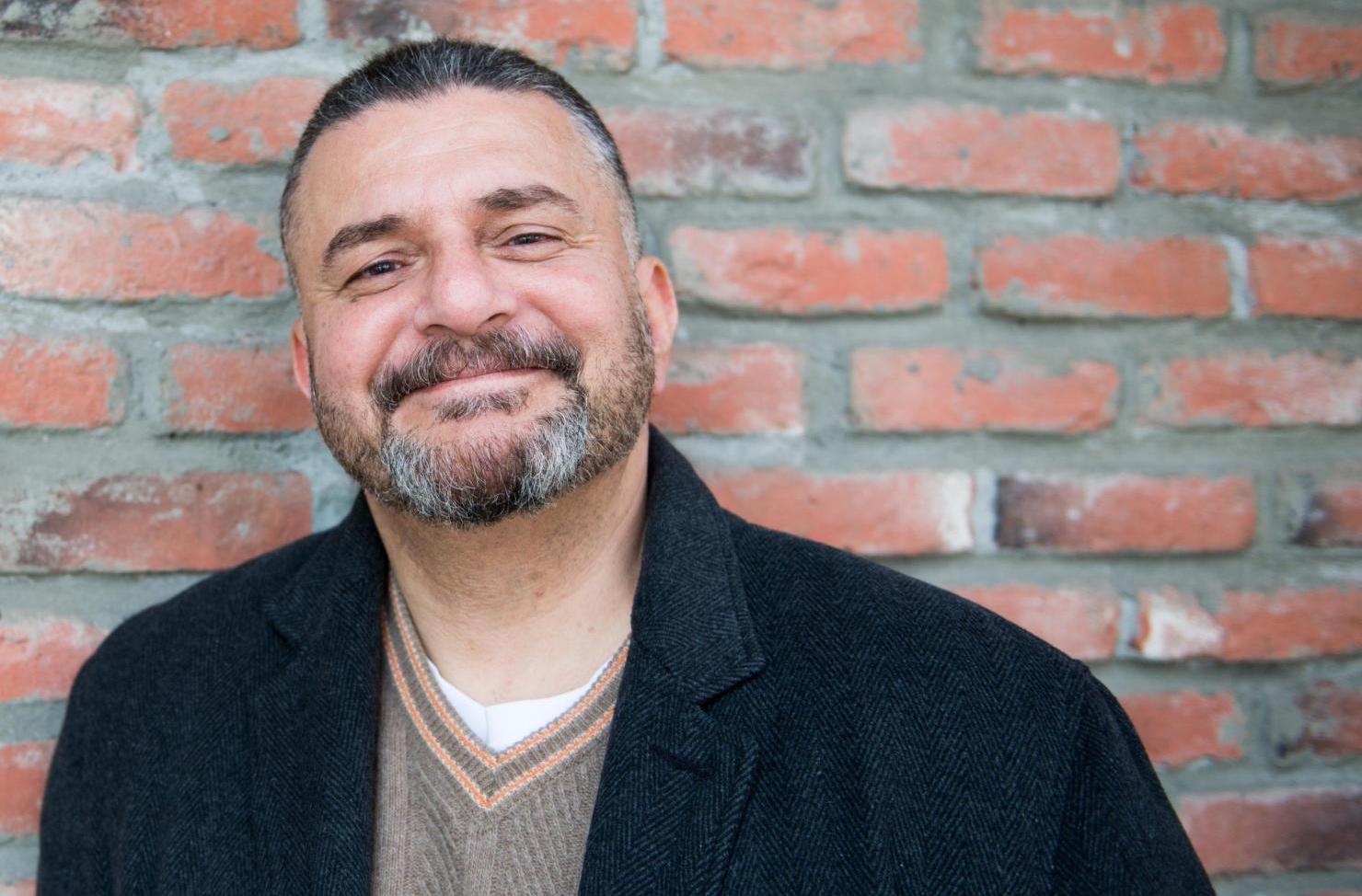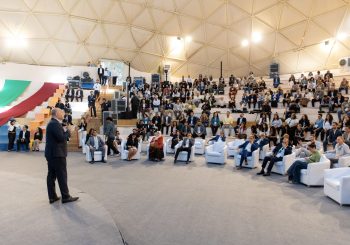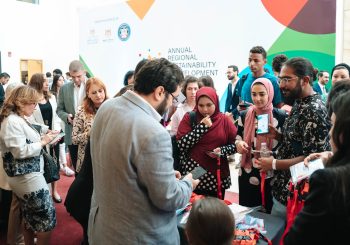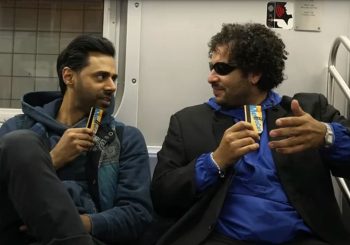Taking an acting class in college in Cairo, I came across a text called Back of the Throat, written by an Egyptian playwright in the U.S. by the name of Yussef El Guindi. As I read through the play, a controversial and thought-provoking narrative of the Arab-American experience post 9/11, through scenes of interrogation and invasion of privacy, I wanted a closer look at the process, and how someone became a playwright in this day and age.
I called Yussef El Guindi in Seattle a few months ago over Zoom for Egyptian Streets’ Spotlight Sundays feature. Earlier this year, he won the 2021 Blue Ink Playwriting Award in Chicago.
Who are you and what do you do?
My name is Yussef El Guindi. I was born in Egypt, I ended up in the States and I’m a playwright.
What do you remember about the first few years of your life?
I have an early memory of being in the crib in Alexandria. I remember looking out of my crib and seeing somebody exiting the door. Then I seem to recall some sort of air raid practice where we had to turn off the lights and I remember this was in the sixties and I remember my brother screaming across the balcony to the neighbor saying “turn off your lights.”
It’s little snippets because I immigrated when I was three. I was brought up in England.
When did you come back to Egypt next?
I came back to AUC (The American University in Cairo) to do my undergraduate degree, did a degree in English and Comparative Literature. We were back in the old campus which I love and it was downtown Cairo and everything. We would go to Felfela, and I think they had a Wimpy’s back then.
It was a great time and I was very much involved in theater and acted in a lot of plays. I wanted to be an actor. I did some playwriting because I loved literature and I did like to write.
What was the transition like for you going from London to Egypt for the first time as an adult?
I came back like a complete khawaga (foreigner). My father wanted me to learn English and he sent me to boarding school. That was the thing to do back then. Nobody realized that the kids were forgetting their Arabic. So when I came back to Cairo, it was a rocky transition because my Arabic wasn’t great at all, and what a shame. I loved it, but I was always at a disadvantage because my Arabic wasn’t great. It’s embarrassing when you’re an Egyptian and you come back to Cairo and you don’t know Arabic as well as you should.
I always remember this argument I had with a waiter in a restaurant in Cairo where he thought I was faking it. He thought I knew Arabic and I was just pretending to speak in English. I spoke what words I knew, but it was always embarrassing.
If I knew Arabic as well as I knew English, I might have considered staying. I had dreams, me and a bunch of people, of starting a theater. It never came to be, but that was one of the roads. What if I had stayed in Egypt and we had started a theater? I’ll never know.
What do you think your life would have been like had you grown up in Egypt?
I do look longingly at Egypt in the sense of all the rich stories that can be mined. In the mid-eighties I had a choice, either go back to England and pursue theater there or continue in America. I chose the states because it was the road less traveled. I knew London and I wanted to try something I didn’t know.
Now at this point in my life, I look back and I know the road that I traveled in the states. I wonder what my life would have been like if I had stayed in Egypt.
I look at writers in Egypt and I do think how lucky you are in the sense that you have all these rich stories to mine. It’s such a rich country and there’s so much talent there.
As much as I would like to situate a play in Egypt, and I have done with a few plays, I’m not as much of an insider as somebody who lives there constantly. Yes, I have connections. I used to go back every year, and I have certain knowledge, but it’s not the same knowledge as somebody who lives there constantly.
How do you think your Egyptian identity contributes to your plays?
My plays are essentially about immigration and immigrants. I funnel my interest in the subject matter through the prism of Egyptian and Muslim characters because that’s my background and it’s much easier to have a play where a character is Egyptian than it would be to have a character who’s Vietnamese for instance, because I know the culture more and I can tap into that.
But people will come to see my plays in America and they’ll go, “that’s just like my immigrant family” because there is an experience that all immigrants share: of being a fish out of water, of trying to adjust to a new culture, and trying to explain yourself to people.
Initially, I really didn’t know what my subject matter was. It took me a long time to transition from hearing British voices to American voices. My first American play was six or seven years after I arrived (in the US). I finally got comfortable with where I was, the sensibility here, the accents, the voices, and then it wasn’t until I became a citizen of the US that I finally understood what my subject matter was.
Being raised in England, when I was growing up, they never let you forget that you weren’t English, and they were a little xenophobic.
I remember coming out of that naturalization ceremony and thinking “Now I’m a US citizen. Now I belong to a narrative about people who come from other places. They come to this country and become citizens. And so now everything I write is now going to be part of that immigrant narrative.”
That, for me, became an umbrella or a way to bring together all the various strands of my life.
Suddenly, it all made sense to me at that point. And I really felt I had something to write about.
My immigrants were Arabs, Egyptians, Muslim characters because I could tap into that and I wanted to have those characters be part of the tapestry of the American narrative because we hear about other groups in the stories told about the US but we don’t often hear about the immigrants from the Arab world.
Do you remember what it was like to watch a play of yours being performed for the first time?
Yes, it was at Carnegie Mellon in Pittsburgh. I wanted to be an actor initially, and I actually applied to six acting schools and they all rejected me. I had a backup plan, which was Carnegie Mellon and playwriting, it was the only school that accepted me.
I found myself living out plan B, playwriting.
When I wrote this play, it was performed by the students. It was a festival of plays and my play was one of them, it was a comedy and the audience really responded to it. It shocked me.
I thought “This is wonderful. I wrote something here. It is. I’m getting a big response.” It inspired me. I was so overwhelmed with the response that it stopped me from writing my second play for a long time because I was trying to repeat the success of what I had done. And of course, that’s death, when you try to duplicate something. I felt the pressure of writing something equally fun and entertaining.
It actually took me another two years before I wrote my second play after that experience. Plus, in graduate school, it’s very intense and very craft-oriented and you’re getting a lot of feedback, so for a long time, every time I started something, I was critiquing it before I would even finish it.
You can’t be a critic in that first draft. After that first draft is down, then you put on your critic’s hat but you can’t keep critiquing in the first draft, because you’ll never get it down.
When did you decide to make playwriting your “thing” beyond college?
It took me a while. I was doing playwriting, but I thought I really wanted to be an actor. I went to San Francisco for a couple of years, even though I worked at a couple of theaters as a dramaturg and as a reader of plays, I still thought of myself as an actor.
Then I had to try and stay in the country. My work visa was running out and I finally got a job teaching at Duke University, I got my green card through teaching playwriting, but still, I thought of myself as an actor
Then somewhere in the mid-nineties, I don’t know what happened, but the acting bug just left. It was gone and I didn’t want to act again.
Then I thought I would be a filmmaker, but it just didn’t feed me artistically. There were such mechanics involved in the whole process that I just went back to plays.
It was in my late thirties, early forties, that I finally said I’m a playwright, it was the last thing left. I remember completely recalibrating. Up until that time I’d been writing these big, long plays about heavy subjects, and I just stopped everything and I needed to find the joy in writing for theater again and I gave myself a task. I was going to write short 10 minute plays. I was with a group and I would write them and then I would perform them right after. The thing with theater, and any discipline is you have to get practice. And I wasn’t getting enough practice as a playwright.
So whatever craft you’re involved in, you need to practice, and that was a very good way for me to write something, see it on its feet, see what was working, what was not working, and learn my craft again.
Throughout the years, I’ve been learning little bits, but this was a good concentrated way to relearn and get back into theater. Then from the 10-minute plays, I went to one-act plays, and from then I went to full-length plays and so on.
I was pretty much a late bloomer, as far as playwriting. It’s funny, I got a reading in Cairo when I was at AUC. It was numerology and they told me “nothing’s going to happen for you until later in life.” I am definitely the poster child for late bloomers. If you’re in your late twenties, mid-thirties and you think nothing’s happening well, wait, things can still happen.
Wow. What’s your favorite play that you’ve written so far?
We’ll often say they’re all my children and it’s hard to select a play. They each have their challenges and the play that I didn’t like, a play that put me on the map here in the States to some degree, Back of the Throat, I actually hated that play. It took me such a long time to write it.
I remember when I first watched it, I hated it and I wanted to switch it out and it ended up being quite a successful play. I think the lesson is that people sometimes think that the play that flows out of you easily, it’s the one that surely is going to be the successful one, and the piece that is difficult to write and feels so problematic is the one that will be least successful. And actually, that’s not true.
I’ve since subsequently understood that whether the play comes out easily or not so easily, that is not going to determine whether or not it’s a success.
Back of the Throat was so problematic to write. It was written very shortly after 9/11, I think I started two months later, and it was just very difficult given the atmosphere it was in. The play taps into a tradition of detectives, agents, interrogating somebody, and this whole genre of interrogation, we see it everywhere. So I was trying to find a way of tapping into the uniqueness of the situation and the character. But it was difficult. I kept starting it and putting it off, I would write a chunk and put it away.
I have a distinct memory of being on a bus in Seattle, going “I’m done. This play is so difficult. I’m just going to put it away. I’m not going to think about it anymore. It was a good, interesting experiment.” And I went and wrote another play, Ten Acrobats In An Amazing Leap Of Faith.
Then I said let me just look at Back of the Throat again. And I read it with a certain objectivity, I was able to engage with the characters and finish it, but – not an easy play.
The play that I enjoyed writing is Pilgrims Musa and Sheri in the New World. I just liked the characters, I have great sympathy for them.
Whatever play you write, you have to have lots of empathy for the characters. Even the ones you disagree with strongly, you have to put yourself in their shoes. I think Bernard Shaw talks about giving his best arguments to the people he least agreed with, and sometimes I’ll be giving good political arguments to characters whose politics I hate.
My job is to make the audience consider their viewpoint. Otherwise, there’s no drama, it’s just your agenda driving the play.
You have a very talented family. Your grandfather was the popular director Zaki Toleimat, your grandmother was Rose al-Yusuf, and your uncle was iconic writer Ihsan Abdel Quddous. What was it like for you growing up in such an artistic family, possibly opposite to the experience of many Egyptians whose families encouraged them to shift away from the arts for the sake of a “more practical” career?
My father was very concerned. My father’s father was Yussef El Guindi and he was into politics so my father was concerned for me and would have preferred I had become a lawyer. But my mother understood, her father, my grandfather Zaki Toleimat, he was a very well-respected director, he wasn’t a rich man, so my mother understood that this notion of pursuing something you love, isn’t necessarily going to bring you lots of money.
She was very supportive and yes, I think that made a difference. My grandfather came to see a play of mine when I was in AUC as an actor and I think his note was “you need to speak up, I couldn’t hear you.”
My grandmother, Rose al-Yusuf, died before I was born but I did hear lots of stories about her growing up, and my uncle Ehsan Abdelkodous was supportive. I showed him a couple of stories. But I think even in the family, everybody knows that this is a very precarious existence, that it’s a tough road and you really have to be passionate about it.
I always say it’s not what your passion is, it’s what you are willing to put up with. Because every passion comes with problems. Every passion has its obstacle course, its disappointments, its failures, and I think the reason why I switched from acting and finally just focused on playwriting was that I could no longer deal with the obstacle course that was acting.
Whereas playwriting, also comes with huge obstacles, but I can put up with that.
My father died before my career as a playwright really started and so I’m really sorry that he never got to see me make some headway in it, but I’m so glad my mother did. She passed away two years ago, but I’m so glad she got to see me slowly begin to move forward in my profession.
She understood, and I think my father understood. He tried to get me to be a lawyer but I think he just gave up. You have to persist and you just have to go “this is what I’m doing.”
This article is part of our ongoing initiative, Spotlight Sundays where we hope to celebrate different Egyptians from the community.
If you’d like to be featured or have any other inquiries, please email us at: [email protected]
Subscribe to the Egyptian Streets’ weekly newsletter! Catch up on the latest news, arts & culture headlines, exclusive features and more stories that matter, delivered straight to your inbox by clicking here.








Comments (2)
[…] Yussef El Guindi: From Acting to Playwriting, an Egyptian, British and American Life Defying a Culture: The Challenges of Being a Childfree Woman in Egypt […]
[…] Yussef El Guindi: From Acting to Playwriting, an Egyptian, British and American Life Defying a culture: the challenges of a childfree woman in Egypt […]